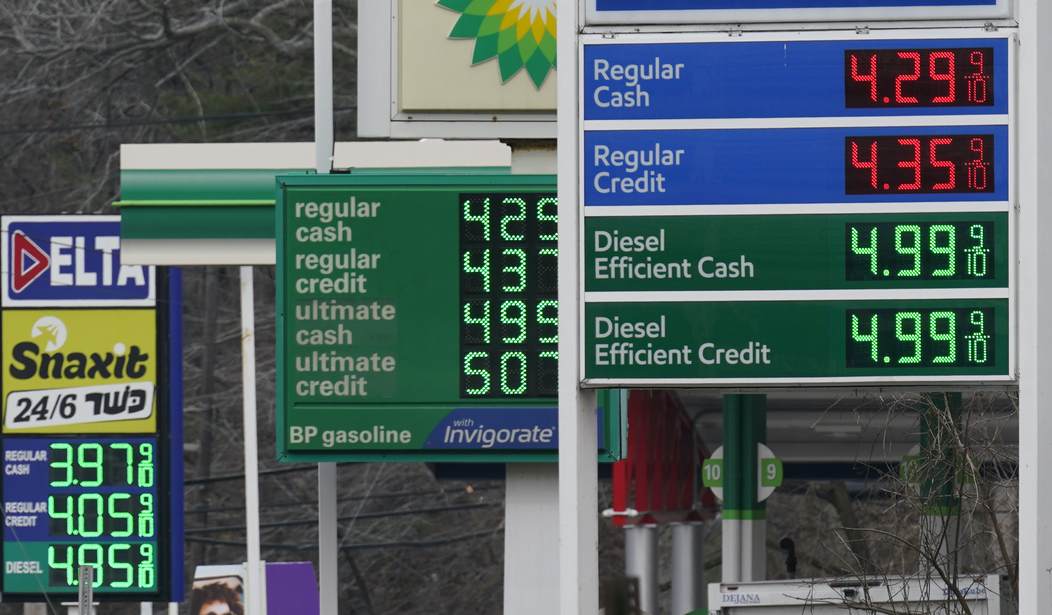Like any commodity, gasoline prices vary from place to place. There are many influences on gasoline prices; for most of the 30 years we lived in Colorado, gas was noticeably cheaper in Wyoming than in Colorado because the Cowboy State didn't tax gasoline as much. Here in the Great Land, gasoline is on the expensive side despite all of the petroleum we have here because we lack refining capacity; a lot of our gasoline and diesel fuel comes up from refineries in the lower 48.
But California? California has oil, and it has refineries - at least, what the "progressive" politicians running that state have allowed to remain in place - so why, then, does California have the most expensive gasoline in the United States? A tank of gas will cost you more in California than in Hawaii - where every gallon is imported. Why?
Two reasons: "anti-price gouging" regs and climate scolds.
Democratic California Gov. Gavin Newsom signed ABX2-1 into law on Oct. 14, empowering state bureaucrats to require refiners to maintain certain inventory levels in an effort to prevent alleged price gouging by energy companies and adding to the list of anti-fossil fuel industry policies and regulations in the state. Along with rules already on the books, the new policy will further squeeze refiners and fuel producers, undermine supply and send prices even higher with the help of other costly rules on the books regulating the fossil fuel industry, according to several energy sector experts.
This ill-advised bill is only part of it. California has levied some expensive requirements on the gas that is delivered at the pump, including a "low carbon" fuel requirement put in place that can only raise gas prices even further. The California Air Resources Board (CARB) estimates an added cost of another 47 cents per gallon due to the new regulations.
His (Newsom's) administration last September estimated that its low-carbon fuel standard could raise gas prices by 47 cents per gallon starting next year. And while the California Air Resources Board has been quick to walk back the eye-watering figure, they haven’t put out a new cost for the regulations they’re scheduled to approve next month.
“I can’t tell you why they didn’t update the numbers, but I can speculate,” said Danny Cullenward, a climate economist who serves on a CARB advisory committee. “The obvious answer is because the numbers are scary.”
Supply and demand cannot be averted. All of Newsom's "Green New Deal" policies and regulations will reduce supply. Energy companies already find California a difficult place to do business, in no small part because of all of the myriad fuel blends this state requires. Drivers, of course, find California difficult because of gas prices; and bear in mind, that these "green" policies are accompanied by restrictions on development that require long commutes for lower-income workers. While on a project in Silicon Valley in 2017 - seven years ago - I remember speaking with a grocery store checkout clerk who described her 60-mile commute, required because she couldn't afford to live in the Bay Area and couldn't find a job in the Central Valley.
This is what Gavin Newsom's green policies have wrought.
And the Newsom administration is planning to make things worse still - by driving away suppliers and restricting supply even further.
At about $4.64, California already has the highest per-gallon gas prices of any state in the U.S., according to AAA gas price data. In the week since the bill became law, Phillips 66 announced that it plans to close one of its refineries in the Los Angeles area in 2025, meaning that one of California’s nine refineries and 8% of the state’s available refining capacity will be closing down, according to the Los Angeles Times.
And it's not just Phillips 66 that's bailing on the once-and-former Golden State.
The news follows an announcement in August 2024 that Chevron, the second-largest U.S. oil company, will relocate from its California headquarters to Texas. The company, with roots in California dating back to 1879, will transition its headquarters to Houston over the next five years.
Chevron’s move comes as a response to California's stringent regulations and aggressive climate policies. Chevron's CEO, Mike Wirth, expressed concerns about the state's business environment in an interview with The Wall Street Journal.
Incentives matter. The climate scolds in Sacramento are making it harder and harder for oil companies to do business in California. So they're leaving - and who could blame them? The high prices of gasoline in California aren't due to "price gouging" or excess profits on the part of oil companies. The high prices of gasoline in California can only be laid at the feet of Green New Deal-loving politicians in Sacramento and the unelected bureaucrats that enforce the regs that emit from the state capitol.
See Related: 2023 Was a Warm Year - Here's Why (Hint: It Wasn't Just Us)
Deep Time, the Milky Way, and Earth's Climate - an Issue on a Staggering Scale
California should serve as an object lesson for the rest of the nation in this matter. "Green" energy policies, touted as a response to climate change, pushed by scolds and enforced by unelected bureaucrats, always - always end up hurting the regular folks. They twiddle their long green fingers in the energy market, and every twiddle adds to the cost of energy. Markets, as I keep saying, are messy; they are complex, and they are unpredictable at times, but if left alone, free markets generally get things right in the end.
In California, there is no free market for energy. That's what's wrong. And as long as that state continues to suffer under a Democrat majority in Sacramento, it's not going to improve.
CARB did not respond to a request for comment.
You don't say.














